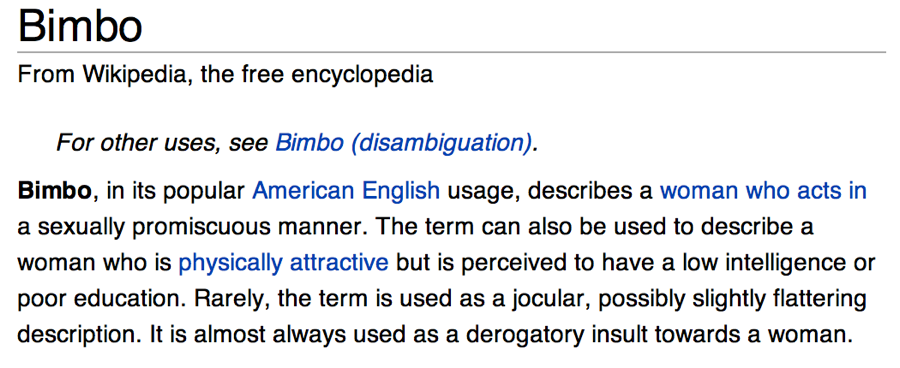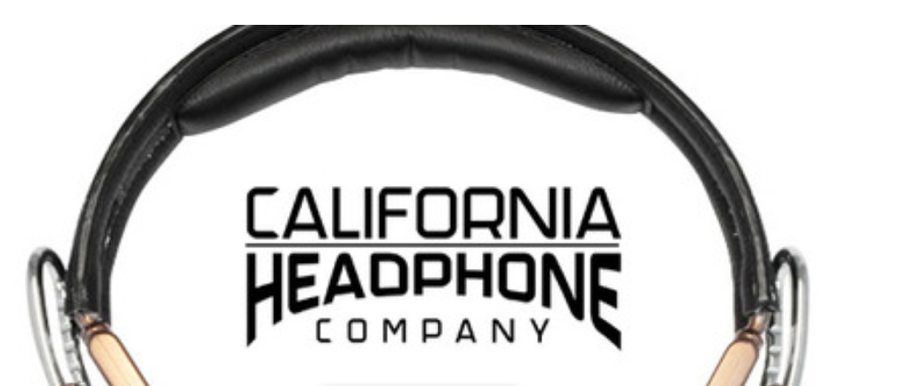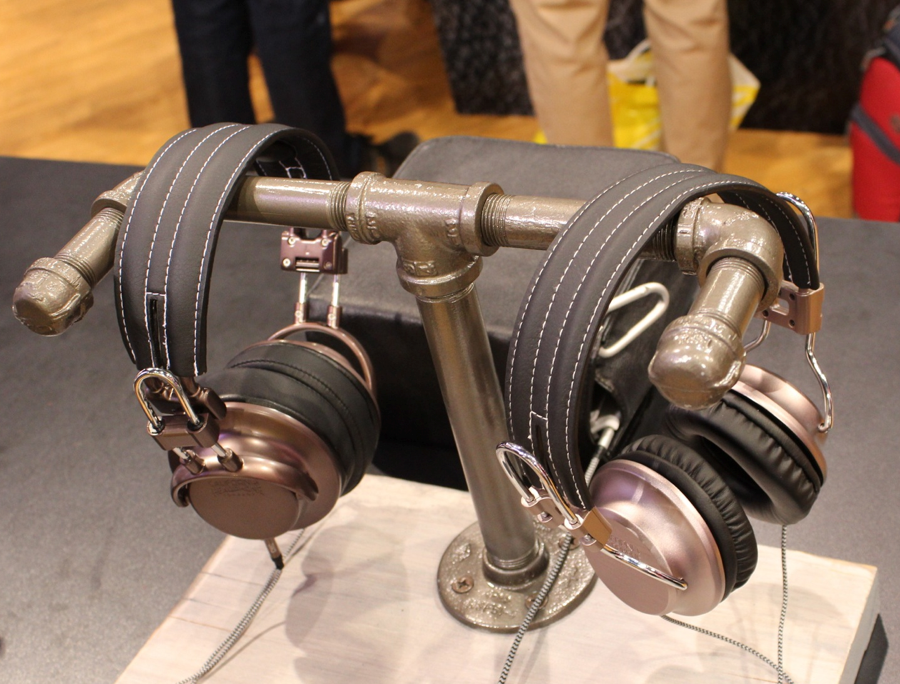
My apologies for the rather sexist title of this post. I tried to find something more “PC” but could not come up with anything that was even close in its accuracy when trying to describe the situation we ran into time and time again during CES 2013.
As is so often the case at trade shows, there were numerous attractive women in scantily clad outfits showing off the latest gear. In fact, in some cases, referring to them as “scantily clad” would be an overstatement. For example, on the first morning the show floor was open, I happened to pass by a petite woman with long black hair, a thong bikini and … not much else. Her hair was taped in place in order to cover her breasts and another woman was painting her entire body with black body paint. What this had to do with consumer electronics was beyond me but so be it.

Later that day, Judie and I passed by the California Headphone Booth. Judie’s husband Kevin has a pair and, in fact, was using them the night before in our suite. The California Headphone Company started life as a Kickstarter project. Judie and Kevin backed the project, and, for $65, Kev got a pair of the Laredo edition California Headphones. We stopped by because I had admired Kev’s, and Judie wanted to show them to me.

An attractive woman was working the booth and walked up to us. Wondering what the post-Kickstarter price was I asked her, “What’s the MSRP?”.
She replied, “I don’t know, I would have to get someone from the company to find out.”
Judie said, “Okay, we just wanted to know what the post-Kickstarter price was.”
She looked at Judie like a deer in headlights. “What’s Kickstarter?” she asked.
Then she went on to say, “I do know that these sell for $99, and the other ones are $199.”
Apparently she had no idea that the company she was representing had used Kickstarter to launch their product, and she didn’t need to ask a company rep in order to find out what the post-Kickstarter MSRP was. What she needed to do was consult a dictionary and find out what MSRP stands for in the first place, and in that moment we realized we didn’t need to waste another second with this Booth Bimbo.
So there she was at the Consumer Electronics Show working the California Headphone Booth without knowing the history of the product or what MSRP stood for. I have no issue if companies want to grab attention by having attractive people show off their goods, but the least they can do it give them a few minutes of training before they turn them loose.
It is just common sense… and good business.

I agree with you whole heartedly Dan, but as I have seen this type of stuff before, I have an idea how it worked. I am guessing a modeling agency called them up because they fit what the vendor was looking for and then sent them to the show. Some may have only been there for that day or for the whole show. They may have known that they may be almost naked (in the cases of the painted models) or not. They usually are also local to the area. Usually they are models who are just starting out. I see this all the time at the Columbus Auto Show or the Arnold Classic. I never ask the booth babes any detail as they usually don’t know anything beyond how to look beautiful, pose and hand out samples. They are paid to look pretty and to hold the product. That’s it. It’s quite sad really.
I’m a little disappointed in this article, Dan, based on the language you used. While I agree with you that it’s terrible business practice to not prepare the lovely lady with the right information, and pretty sad that she didn’t know what MSRP stood for, I think calling her a bimbo just because she was employed to be attractive is a pretty far stretch.
Don’t shame the women hired for this job by calling them bimbos–shame the companies for hiring them to appeal to the basest instincts of their supposed customer base, and, in many cases, not doing their homework on their buyer personas to realize that the sexualized advertising turns them off. As professional in the marketing industry, I see this happen all the time and it’s just plain terrible all around. But let’s not punish the women who are doing what they were hired to do by calling them nasty names. The root of the problem is bad brand marketing and it needs to be addressed as such.
Don’t blame the messenger. Did you ask is she worked for the company? If her job was to hand out samples and then refer you to a company rep, then she has done what she was paid to do. She even offered to get a rep to discuss. As for not knowing what MSRP is, if she has never bought a car on her own, she may not know what it means. A car purchase is usually where most folks first hear “MSRP”.
Cut the kid some slack.
I get that the women who were doing the body-paint thing were hired because they were “hawt”, and I doubt that anyone watching expected them to know anything more than the name of the booth they were working at (if that). In other words, I’m sure that no one was asking them any questions.
But it is different when you are in a booth situation and dealing one-on-one with conference attendees.
I have worked trade shows and markets before in similar booths, and when I was working — whether it is for the week, the day, or for an hour — I always had at least a basic understanding of the product I was trying to sell.
Dan and I were looking at the headphones and discussing them amongst ourselves. The young woman walked over to us, saw our press badges (and therefore knew we were not CES Buyers), and she asked if we had any questions. In my experience at least, that would imply that she might have some answers.
I would hate to think that we are setting our expectations too high by thinking that a pretty woman working in a booth ought to know a little bit about the product she is “selling”, and Dan did sum that up at the end of his post:
“I have no issue if companies want to grab attention by having attractive people show off their goods, but the least they can do it give them a few minutes of training before they turn them loose.”
Jess, I understand your concern with the term ‘Bimbo’ and the need to ultimately call out the companies who hire them, and I’ll admit that I was a little taken aback by Dan’s use of the word when I edited his post.
But I let it stand for a reason: these women who are working trade shows are ultimately responsible for how informed (or uninformed) they are about the booth’s products. How hard is it to ask the company contact a few questions or ask for a company data sheet? Only they can ultimately control how vapid or intelligent they will be perceived to be … and there is nothing more refreshing than a gorgeous young woman working a booth who knows what she is talking about.
I understand where both you and Dan are coming from, Judie, but I ultimately believe that the onus is NOT on the women hired to do this job. It belongs solely in the laps of the companies who feel like hiring models for one-off conventions and not providing them the correct information to do their jobs. Sure, if this girl was provided a fact sheet that she ignored, then yes, part of the fault is her own. But generally, if a company is hiring models, the women being hired usually don’t have a lot of lead time on the job, may not know what the job is until they get there, and in many cases are just set loose to “look pretty” with little to no preparation.
It’s truly a different situation than if you or I were hired on to be in a booth selling something. I also still think that the use of the word “bimbo” is insulting because it boils down to slut-shaming, which I know wasn’t Dan’s intention, but that’s the connotation of the word despite context otherwise.
What needs to be happening is that companies at CES should put people who are truly enthusiastic about their products in the booths, not random people who are thrown into the mix at the last minute. I know they do this to supposedly save cash that they’d use to fly in employees and put them up for the show, but if it translated to more sales overall, you’d think they’d be on board for it. Hiring women to look pretty is passe and quite frankly bad marketing, and it just shows that they haven’t done their homework when it comes to their audiences.
Jessica- I apologize if I offended. I’m not big on sexist terms and I honestly debated with myself whether to go that route. Ultimately I did (obviously) for the shock-value/sarcasm aspect of it and because it is clear that the company hired them for one reason and one reason alone.
I do fault the companies for not giving any training to people who are showing off their wares. At the same time, if someone is at the booth, APPROACHES us as Judie explained and asks if we have any questions while apparently knowing NOTHING about the product the responsibility is shared. I mean, Google “California Headphones” and you see the headphone models, the price AND Kickstarter on the first screen. It takes 5 seconds to get the basic information. Not having it doesn’t show well for the company OR the person working the booth. Moreover, it makes clear that the company hired the people they did for one reason and one reason only. That’s too bad because being attractive and knowledgable aren’t mutually exclusive.
I know from working with you here at GD that you’re not that kind of guy, Dan, so I didn’t really take personal offense, I just know how it can look to others who stumble upon articles on the web. This is also a personal hot button of mine–tech companies who think that marketing ends at using an attractive woman to schill your not-really-at-all-related-to-attractive-women product. THAT is what is sexist and disgusting to me. It’s 2013 and you’d think we’d be past all that, you know?